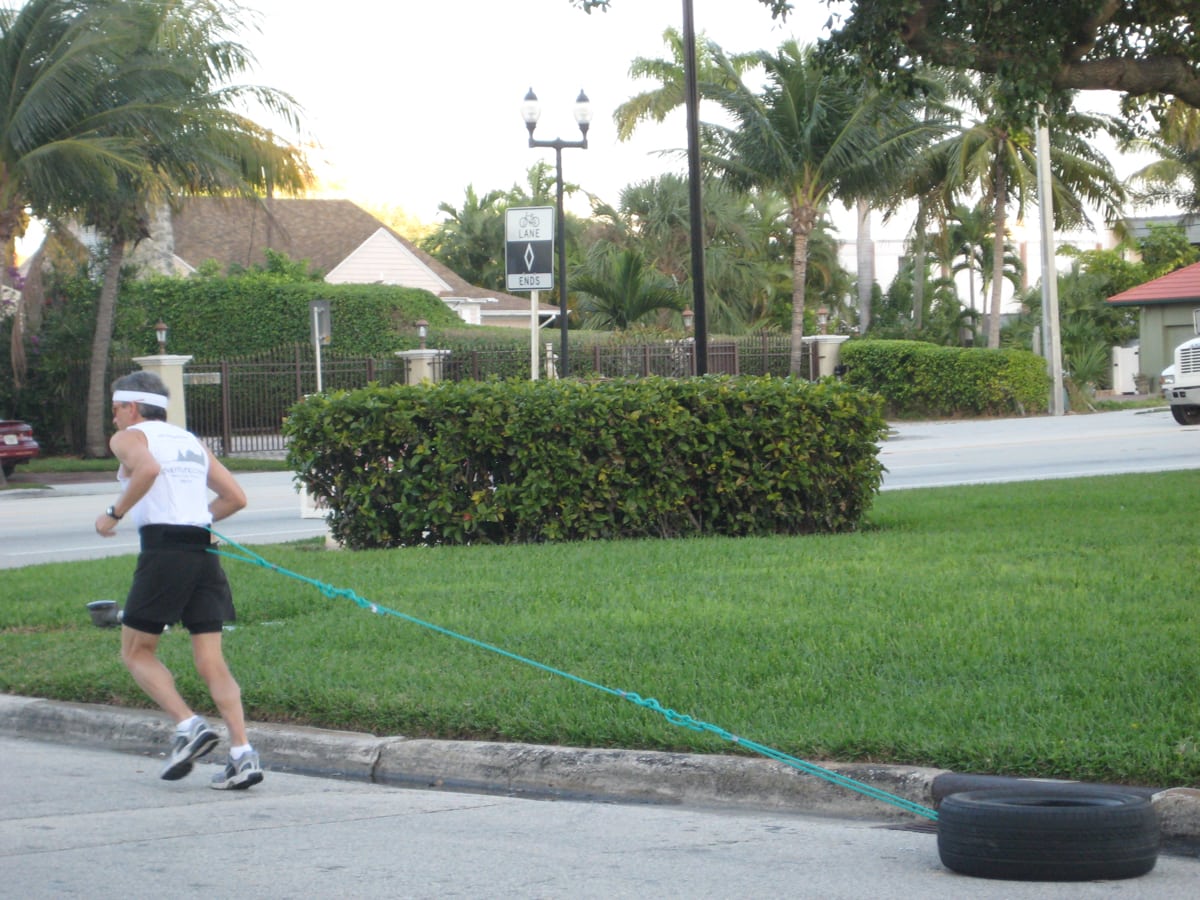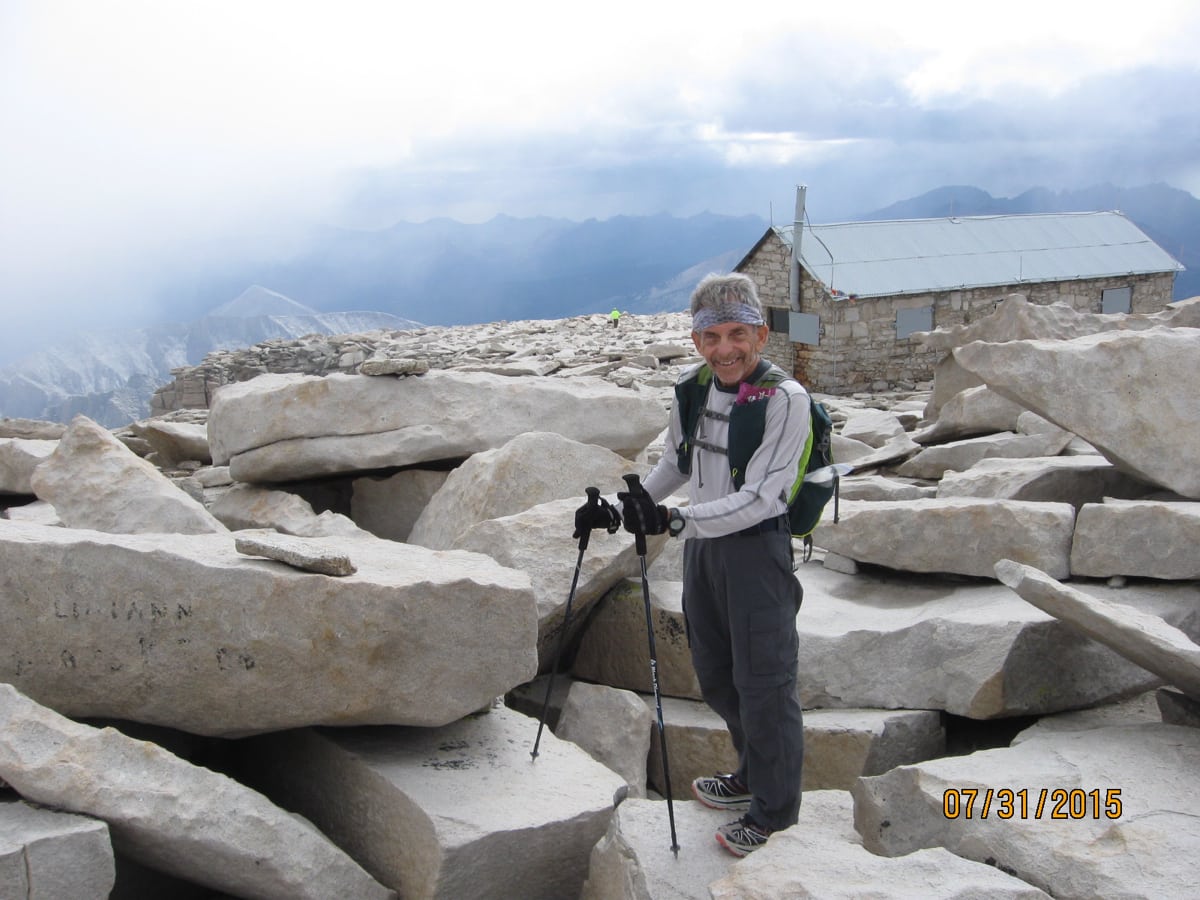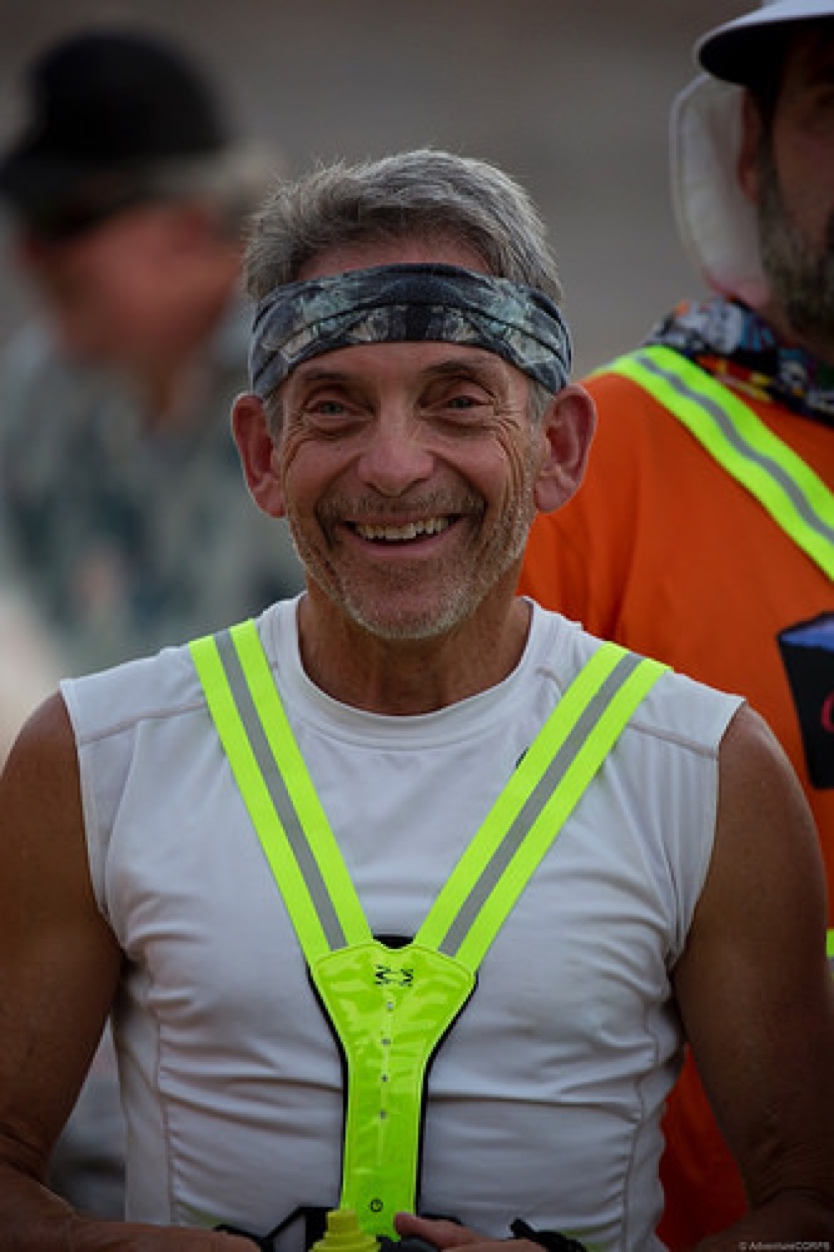When Bob Becker crosses the finish line at this year’s Badwater 135 later this month, he will become the race’s oldest finisher at 76 years old. The Badwater 135 starts in Death Valley, the lowest point in the United States at 280 feet (85 meters) below sea level, and finishes 135 miles and 14,600 feet (4,450 meters) of vertical gain later at Whitney Portal. Temperatures can hit 120 degrees Fahrenheit or more (48.9 Celsius). The race’s final cutoff is now 48 hours instead of 60, so Becker’s finish will also reset the race’s Oldest Ever record, set in 2010 by Jack Denness, by more than 11 hours. If Becker PRs this year, he’ll improve the Oldest Ever record by over 19 hours. A high order indeed, but he is optimistic.
The following is a transcript of a Zoom interview with Becker. It has been edited for brevity and clarity.
What enticed you to run the Badwater 135 in the first place, and what has kept you coming back?
It goes back to my first experience with Marathon des Sables and the first training camp I went to for it up in the Teton Range with Jay Batchen and Lisa Smith-Batchen. The first person I met there was Nattu Natraj. Well, Marathon des Sables [MdS] was his first ultra race too. We became fast friends. That was in 2005. In 2007, he ran Badwater 135 for the first time, and he asked me if I would crew for him. I loved the experience so much that I applied, and I ran the race myself in 2008.
I’ve actually been at Badwater every year since. This will be my 14th year there. I’ve crewed for nine different runners, and I helped [race director] Chris Kostman as a volunteer once, and this will be my fourth time running it. I love the race. I love the desert. I love the culture of the race. The longer you’re out there, the more friends you have. There’s a particular camaraderie among the people there.
The race is a big story that keeps evolving, and I just love being part of it and watching everything going on around me. And then there are accomplishments of people like Lisa Smith-Batchen and Marshall Ulrich who have done doubles and quads and all kinds of other crazy things. [Author’s Note: A “double” is a there-and-back-again endeavor. You run the course and then turn around and return to the start. Some doubles include the 11 miles to the summit of Mount Whitney, so you travel from the lowest point in the continental U.S. to the highest — and back again. A “quad” is twice that!] Marshall Ulrich just did a winter crossing at age 69 and summited Mount Whitney using ice axes.
What is your goal this year at Badwater 135?
The real goal is to finish it. I’m shooting to become the oldest finisher. I was there the year Jack Denness became the oldest finisher when he was 75 in 2010. I watched him cross the finish line, and it was just spectacular. It just really was. So if I finish it, I’ll be the oldest finisher. But to finish it, I have to come in under 48 hours. When Jack did it, you had 60 hours to finish. His time is 59:13. So if I finish it, I not only become the oldest, but I also beat his record by over 11 hours. If I can PR, then it’s almost 20 hours faster than he did at that point. I’m talking big, right? But it’s not inconceivable if all the stars align. It’s possible. That would be a 39-hour finish basically.
You’ve also done a double crossing. Why did you want to turn around and retrace your steps to the start?
Well, I’d finished the race twice. I didn’t have a whole lot of concern that I could finish it a third time, and I kind of looked around and I realized that nobody much over the age of late fifties had ever done a double. I was 70, and I thought: Why not? I’ll see if I can do a record and be the oldest person to do a double. And I think it turned out that I was the oldest person to summit Whitney to do the 146 [miles] — the original race distance. [Author’s Note: Runners must obtain a permit from the U.S. Forest Service to travel the final 11 miles to the summit of Mt. Whitney.] It was just my goal to be the old engine who still could.
Did the double crossing play out like you expected?
It was as hard as hell. It took me a little longer to finish than I thought it would. It’s not a race. There’s no real cutoff time per se. It was probably the toughest thing I’ve done to this day. Would I ever do it again? Maybe. At this point, though, I’ll be quite content to just run the race in 2021.
Would you do the double again if another 70-year-old broke your record?
I kind of have in the back of my mind that since Marshall is going to be 70 next year… I haven’t talked to him about it, but my guess is he‘ll do something crazy like that, and then of course, I’ll have to go back.

Bob Becker at the 2019 A Run For the Ages at age 74. He won and broke the record of 230 miles. Photo: Caroline Cunningham
What is your training like for Badwater? And how has it changed since you first ran the race?
Lisa Smith-Batchen has been my coach for every major race I’ve ever done. One of the things that’s she’s really great at is recognizing that when you’re in your seventies, you don’t train the same way as you do when you’re in your forties. She adapts the training to one’s age and also the location where you’re living. For example, there are no hills down here [in Florida], so I have to figure that part of it out.
I tend to do fewer miles overall now than I did before and a little more cross training than I used to do, and I know that I’m not going to be running the whole race. I’ll run about half of it and walk about half. Rather than running up front and doing a death march at the end, I plan to do a run-walk right from the beginning of the race. When I ran A Race for the Ages [ARFTA] [in 2019], I played with running for one minute and walking for one minute. [Authors Note: At ARFTA, runners over the age of 41 loop around a mile-long course for as many hours as years they are old. Runners 40 and below only have 40 hours to loop the course. Whoever has run the most miles after the race starts wins. Bob was 74 when he ran, so he had 74 hours to accumulate miles.] That worked well for me. I find that my running pace is faster because I am recovering right away. I ran 230 miles at ARFTA, and I was able to sustain my run-walk the entire time. As long as I’m not too aggressive with my pacing, I think that will make a big difference this year at Badwater.
My game plan and my training plan is to do a one-minute run and a one-minute walk sequence. That’s a big part of my training. I found this timer thing called the Gym Boss. It costs $20, and it allows you to set a few timers. It counts down and then it vibrates, and I switch to running or walking, all on a single battery. It lasts forever.
The other thing is, I live at the beach and I don’t have hills. In Badwater, you’ve got three big climbs, so it’s not like I’m going to do a run-walk sequence the entire time. I’m going to be walking the ups and running more of the downs. I can run in the sand, which builds leg and core strength, and that’s all vitally important [to train for hills]. And I pull a tire. I did that when I trained for Badwater before too.
How much tire dragging do you do?
[Author’s Note: Dragging a car tire behind you to develop core and hill-climbing strength is not as much fun as it sounds. The runner wears a waist belt or chest harness connected to a short rope, which is attached to the tire.]
Right now, I’m dragging about once a week, and sometimes twice. And I’m usually doing five or six miles. Tomorrow, I think [my coach] Lisa has me doing five miles with the tire after six miles running on the beach. It’s a combination where I’m working pretty hard.

Bob Becker training with a tire in 2009. Photo: Suzanne Becker
Are you wearing shoes when you’re running on the beach?
Yes, I wear Altras. I love them.
How fast is your walking pace?
Not as fast as I wish it was. Usually, I’m in the 15-minutes-per-mile range, sometimes in the 16-minutes-per-mile range. And I’m running usually in the high 10-minutes-per-mile pace, sometimes closer to 11 minutes per mile. On average then, it’s somewhere in the 14-minutes-per-mile range by the time you adjust for stops. If I can sustain 16 to 16:30 minutes per mile overall at Badwater, then I’ll PR. I’d be really happy with that.
Has your ability to perform in the heat changed as you’ve gotten older?
Yeah, I struggle a little more with the heat than I used to even though I live in it [in Florida.] The advantage is I can train in the heat, and even though it’s not 120 degrees Fahrenheit [48.9 Celsius], it can be 100 Fahrenheit [37.8 Celsius] with a lot of humidity.
How will you fuel yourself through the 135 miles in such extreme temperatures?
Ensure is a go-to for me. It gives me fat, protein, and carbs. I’ll drink half a bottle an hour [110 calories] and then take in another 100 calories or so with a gel. I just carry water. I will use Tailwind occasionally. I drink Gatorade. I drink Coke. There will be some real food, some salty stuff to offset the sweet. But my basics to get through a race are Ensure and gels.
What will be your biggest challenge at Badwater this year?
Trying to be as consistent as possible, sticking to my game plan, and being in the moment. If I can build my core strength up enough, so my back isn’t a big concern, which it sometimes is, then I’ll be fine. If my back starts bothering me, then I’ll have to slow way down. And we’ll just have to see.
[Author’s Note: Runners depend on their crew to cool them down and provide fluids every few miles at the Badwater. Unlike most ultras, you cannot finish without a crew’s aid. The crew drives almost the entire course with the runner, leapfrogging with them for up to 48 hours.]
What makes for a good crew?
One of the things is you start with no drama. You just have to have a crew that’s compatible. I’ve got a great crew. [My coach] Lisa is going to crew me this year along with Vince Antunez from Trail Toes, and two other friends of mine who have crewed me before. They haven’t all crewed as a unit before, but they all know each other, and I know they will be a very compatible unit. So no drama is where you start.
Secondly, you have to have a race plan that everybody buys into. Also you have to have Plan A, Plan B, and Plan C. And, in my crew, I have experts on different things. I have medical support in Vince Antunez. He knows just as much about feet as John Vonhof [author of the book Fixing Your Feet.] And Lisa coaches. Those are vitally important.
The main thing the crew does is keep you moving. I might get tired and want to go over to the vehicle and sit for a minute. I’ll do some of that, but I won’t do as much as if I didn’t have these guys crewing for me and keeping me moving. And that’s obviously vitally important with as many stops as you can have. Kill a minute here, kill a minute there. It all adds up.
What do you say to runners in their late forties and beyond who are struggling to set goals for themselves because they’re not as fast as they once were?
You may or may not be able to finish first, second, or third, but you may be able to finish top Masters or Grand Masters. There’s plenty of racing still left in you even if the competition has changed slightly. I also certainly wouldn’t poo-poo the notion that as you get older, you can’t win stuff. In fact, two of my last three races, I’ve actually won overall. So, yes, you can do that. Beyond that, sometimes it’s okay to plan to finish in a reasonable time. Plan to pick off a few of the young guns and enjoy the journey along the way.

Bob Becker at the summit of Mount Whitney during his 2015 Badwater double. Photo: Don Nelson
2021 Western States 100 Age-Group Results and Records
The 2021 Western States 100 is behind us, and we saw an incredible age-group record set there. One of you fine readers previously noted that age-group wins and podium spots are not mutually exclusive. And, wow, did Ragna Debats put an exclamation point on that comment. At age 42, Ragna placed third female and 10th overall, running 17:41:13. Her time reset Ann Trason’s 40-49 age-group record, which has stood for the last 19 years, by almost an hour. Watch her post-race interview to hear her thoughts on fast masters running.
Yes, I know Ragna is technically outside our “45-and-up club” here in iRunFar’s Age-Old Runners series, but I’m giving her a pass because she has a young child, and I’m sure that makes her feel as tired as a 45-year-old.
Mike Morton’s 40-49 age-group record of 15:45:21 set in 2013 remained untouched for another year. Any takers? Similarly, Meghan Canfield and Steven Moore’s 50-59 age-group records, 18:50:19 and 18:14:57 respectively, were also safe along with the other 10-year age-group records. Is it time to petition for five-year increments for these records?
Kuni Yamagata, 68, was the oldest finisher at this year’s Western States. He will also be running the Hardrock 100 this month. When he finishes, he will hold the record for the oldest runner to complete both races back-to-back. Go Kuni!
Call for Comments
Becker will be bib number 99 at the Badwater 135. You can follow his race on the race website beginning at 8 p.m. U.S. Pacific Time on July 19 and cheer on his attempt to become Badwater’s oldest finisher. Mark your calendars and please share your questions and good wishes below. We will update this article with his results.
[Editor’s Note: Bob Becker gave the 2021 Badwater a great effort. Reports from the course state he had to drop due to physical issues around mile 50.]

